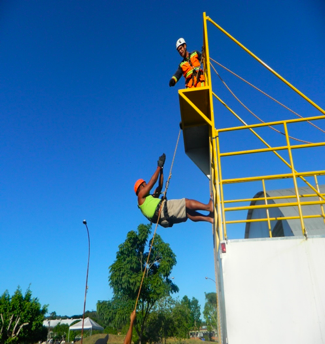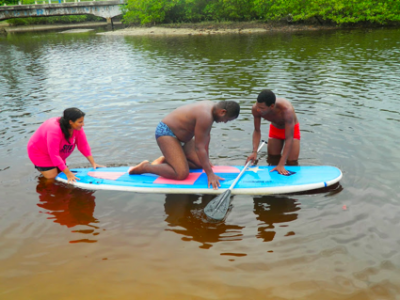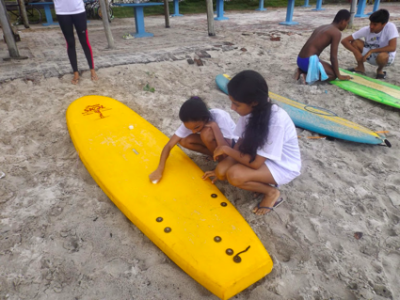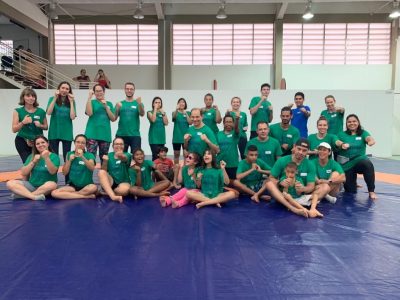By Lauren Lieberman.
Brazil was the perfect location for the third and final leg of my three-month Fulbright journey. We had already made worthwhile contributions in Ghana and Ireland. I had no doubt we’d have great success in Brazil. I had long-term relationships there and knew the country to have an excellent infrastructure in Adapted Physical Education.
Program in San Carlos
One of the first things Katrina and I had the good fortune to do was to teach a three-day graduate course with our friend and colleague Dr. Mey vanMunster at the University of San Carlos. Our first day was a lot of theory and practical ideas. The second day we hosted three five-year-old children who were blind for a morning of motor skills. We had planned all of the stations the day before. The children arrived at 9am with their parents and they were adorable.
That morning I was introduced to Natalia, a five-year-old girl who was totally blind. When I first met her, she was clinging to her mother, unwilling to let go long enough to try anything. I had heard that this was going to happen from Mey who runs this program each week. She said she had not been able to get Natalia away from her mother. With coaxing and clapping, we convinced her to touch a bench used in vaulting. Eventually she left her mother’s lap and began to slide on the box without any assistance. Soon we had her trying the guidewire and walking independently. She was stiff and frightened at first, but with cheering supporters and a proud mother, Natalia said, “I can do this!” And she did.
Later in the day, I found Natalia curled into a ball, sound asleep on the grass. She was no longer clinging to her mother and she would go home with a newfound confidence.
Paralympic Festival
I chose the best time to be in Brazil because I was able to attend the Paralympic Festival in Sao Paulo. Sao Paulo is six hours west of Rio de Janeiro and is one of the wealthier areas in Brazil.
At the festival, over 1000 youth with disabilities from all over Brazil were exposed to sport, many for the first time. The event was hosted by the Brazilian Paralympic Committee, who would ultimately help provide support and coaches for our Camp Abilities in Campinas.
I saw so many youths with visual impairments playing 5-a-side soccer, goalball, running, swimming, and competing in judo. This level of competition and the number of children of ALL disabilities involved was incredible. Brazil is a very large country and the fact that they had the funds to bring all of these athletes to San Paolo for three days was remarkable. I was blown away and this continues to be a highlight of my Fulbright memories.
Camp Abilities Campinas, Brazil
Brazil had hosted a Camp Abilities in the past but not in Campinas, about two hours from our starting point in Sao Paulo.
With the help of several of our friends throughout Brazil, the University of Campinas students, and the Brazilian Paralympic Committee, we had 15 coaches for 8 sports and 15 campers over two days. Fifteen kids who ran and jumped, kicked and tumbled, flew in the air on a trampoline. We did track and field, swimming, gymnastics, roller skiing, adventure activities, martial arts, goalball, soccer, and one of my favorites — tactile bingo! It was extremely hot, but we made it through and there were only smiles all around!
I met Vinny in Campinas.
When I first met him, Vinny would toss a ball and listen for it to land. He couldn’t see it. He couldn’t chase it. He could only hear it. He tossed his ball over and over again, listening to the splat of rubber on the ground. The ball would be returned, and he would begin again. Before Camp Abilities, he had never heard of ‘going to camp’ and he could only dream of playing baseball and soccer. He and his mother spent three days at camp, where he kicked the ball, listened to the beep and ran with the wind. His laughter filled the air as he chased the beep and scored the goal.
But it wasn’t only Vinny learning new things, I learned Roller-Skiing.
Roller-Skiing
Roller-Skiing is basically cross-country skiing without the snow. The skis are on wheels and participants propel themselves with poles. The sport began as a way to practice skiing in the summer months. In Brazil it is always summer, so roller-skiing is quite popular. Now roller-skiing is a worldwide competitive sport for both men and women. I love skiing and I love a challenge. I climbed aboard and with my newfound friends, I took to the asphalt slopes. Who knows, maybe one day we can have roller-skis for all the Camp Abilities.
PEAMA: A Highlight and A Hope
One of my life goals is to foster Universal Design. No one – absolutely no one – should be denied access to anything but especially not to sport. In Jundiai, a municipality about one-hour from Campinas, I found a pocket of utopian access and a model I hope one day to see around the world.
PEAMA (Programa de Esportes e Atividades Motoras Adaptadas) is a progressive program and my visit was another highlight of my entire Fulbright journey. PEAMA’s mission is my mission:
“…equal access to sports activities, and so to include people with disabilities, by using sports as the implement/tool.” (emphasis mine)
Note the words ‘equal access’. Equal Access is Universal Design.
PEAMA offers fourteen activities, including rhythmic gymnastics, aquatic sports and dance. The Municipality provides for paid staff and coaches as well as the necessary equipment and space. THERE IS NEVER A FEE.
To date PEAMA has served 1,393 persons with disabilities. What a testimony to the impact a community can have when they embrace everyone.
While I was there, I watched a dance group with two men in wheelchairs moving to music like I had never seen before. I saw a running group run inclusively in the community, a soccer group playing soccer, a group on the tennis courts, and people kayaking. My favorite was going with 12 people on a 12-mile community bike ride through a beautiful park. These activities, and more, happen every week all year! This is utopia.
The Municipality of Jundiai, all of its citizens, should be an inspiration to us all and I was privileged to experience the people and the program.
Mission Complete (Or Not)
I completed my missions in Ghana, Ireland and Brazil. Like the campers, I met great people, overcame some interesting obstacles, and learned new skills. I saw Vinny and Natalia and so many others discover when You Believe You Can Achieve. I hope I left a legacy of confidence and commitment in my wake.
Camp Abilities is not meant to be a stopping point for our campers. We provide each child with an assessment and modifications they can utilize at home and in their communities to continue to improve performance and to show the ability of all people. Campers leave camp with goals. I too finished my Fulbright Global Scholar Award program with new lessons and new goals.
What I Learned and Where I Go Next
I was asked recently to define three ways the Fulbright made an impact on me. While I could provide hundreds, here are three:
- I’d like to focus on developing and implementing Culturally Sensitive Programs.
- In many areas (most areas), I discovered Marginalized Exclusion AND Inclusive Support. It was a dichotomy I always knew existed, but I was able to see more clearly. I am even more motivated to influence change.
- And, on a personal note, I was reminded of how much I need love and support. I know it is a cliché, but I could not have done any of this without my wife Katrina. She was my cheerleader, my encourager, my rest from long days.
Fulbright Again
This article was written during the COVID Pandemic. We will write soon about our Virtual Camp Abilities, but I wanted to share a new Fulbright opportunity. Fulbright is soliciting applications for a $25,000 grant for alumni. The proposal is to focus on reaching others in a pandemic. I’m applying!
Gratitude
No adventure is completed without a great deal of support. In Brazil, I’d like to acknowledge the following people:
- Dr. Maria Luiza Tanure Alvez
- Dr. Mey VanMunster
- Dr. Joslei De Souza
- The people of Jundiai and PEAMA
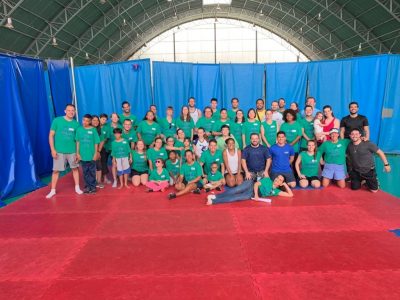
~ Lauren Lieberman

